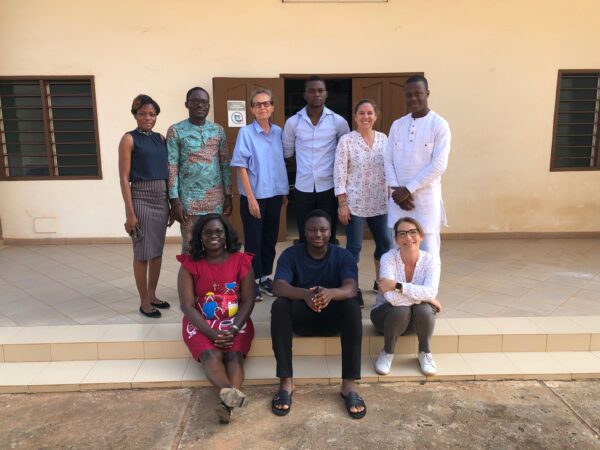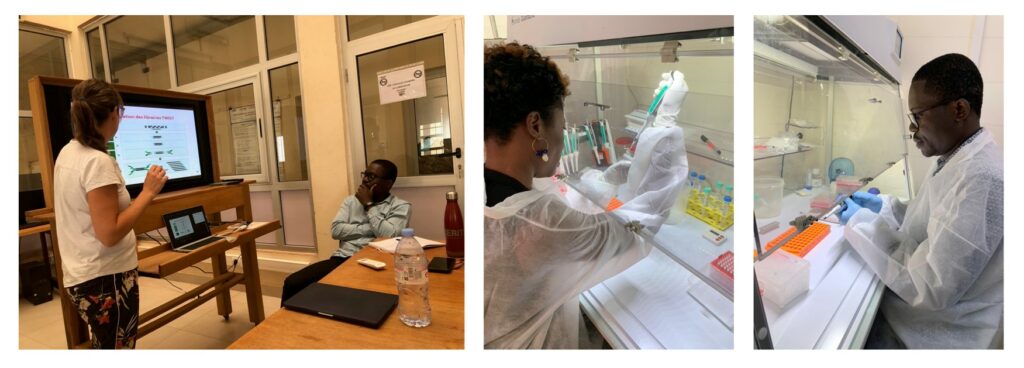Beninese teams ready to sequence Lassa, Mpox and other viruses with high epidemic potential
Beninese teams ready to sequence Lassa, Mpox and other viruses with high epidemic potential

Recent emergences in Benin of the Mpox virus in May, then Lassa in August 2023, have motivated AFROSCREEN partners to develop their sequencing capacities for genomic surveillance beyond the SARS-CoV-2 virus.
Thus, in October 2023, with the support of IRD through the AFROSCREEN project, the IRCB (Institut de Recherche Clinique du Bénin, directed by Pr Achille MASSOUGBODGI, supported by UMR IRD MERIT) and the LFHV (Laboratoire des Fièvre Hémorragiques et Virales et Arboviroses, directed by Dr Anges YADOULETON), have strengthened the sequencing platform, with new quality control equipment (Tapestation, Agilent) and panviral sequencing reagents (for sequencing over 3,000 viruses). These two institutes organized the training of 6 Beninese biologists in NGS sequencing of the Lassa and Mpox viruses, on samples collected during the epidemic phase.
La mission des deux ingénieures de l’IRD TRANSVIHMI Christelle BUTEL et Laetitia SERRANO s’est déroulée du 9 au 20 octobre 2023 au laboratoire de l’IRCB à Abomey-Calavi. Elle a permis de consolider l’expertise théorique et pratique en séquençage et en analyses bioinformatiques des données de séquençage des deux biologistes béninois, Odilon Paterne NOUATIN (IRCB) et Islamiath KISSIRA (LFHV) qui avaient déjà bénéficié d’une formation initiale de 2 mois à Montpellier en début de projet sur le séquençage du SARS-CoV-2, ainsi que l’expertise de Flocas DANSI SOCLO (LFHV), Antoine HOWDONOUGBO (LFHV), Olga QUENUM (LFHV) et Stéphane SOHOU (LFHV).

The sequencing results obtained during this training course on IRCB’s iSeq100 (Illumina sequencer, supplied by AFROSCREN) were excellent, with the production in just a few days of complete, good-quality genomes for the Lassa and Mpox viruses for the first time on site in Benin.
The technical mission also provided an opportunity to discuss ways of improving experimental sequencing protocols in Benin, and to take stock of the laboratory’s needs in terms of equipment, facilities and further training. The sequencing capacities of the LFHV and IRCB teams have been strengthened to enable them to react more rapidly to new epidemics of Lassa, Mpox or even other viruses (e.g. arboviruses), to identify strains and thus document the origin of emergences, and to inform public authorities about the circulation of viruses with high epidemic potential to help control them.
Recent emergences in Benin of the Mpox virus in May, then Lassa in August 2023, have motivated AFROSCREEN partners to develop their sequencing capacities for genomic surveillance beyond the SARS-CoV-2 virus.
Thus, in October 2023, with the support of IRD through the AFROSCREEN project, the IRCB (Institut de Recherche Clinique du Bénin, directed by Pr Achille MASSOUGBODGI, supported by UMR IRD MERIT) and the LFHV (Laboratoire des Fièvre Hémorragiques et Virales et Arboviroses, directed by Dr Anges YADOULETON), have strengthened the sequencing platform, with new quality control equipment (Tapestation, Agilent) and panviral sequencing reagents (for sequencing over 3,000 viruses). These two institutes organized the training of 6 Beninese biologists in NGS sequencing of the Lassa and Mpox viruses, on samples collected during the epidemic phase.
La mission des deux ingénieures de l’IRD TRANSVIHMI Christelle BUTEL et Laetitia SERRANO s’est déroulée du 9 au 20 octobre 2023 au laboratoire de l’IRCB à Abomey-Calavi. Elle a permis de consolider l’expertise théorique et pratique en séquençage et en analyses bioinformatiques des données de séquençage des deux biologistes béninois, Odilon Paterne NOUATIN (IRCB) et Islamiath KISSIRA (LFHV) qui avaient déjà bénéficié d’une formation initiale de 2 mois à Montpellier en début de projet sur le séquençage du SARS-CoV-2, ainsi que l’expertise de Flocas DANSI SOCLO (LFHV), Antoine HOWDONOUGBO (LFHV), Olga QUENUM (LFHV) et Stéphane SOHOU (LFHV).

The sequencing results obtained during this training course on IRCB’s iSeq100 (Illumina sequencer, supplied by AFROSCREN) were excellent, with the production in just a few days of complete, good-quality genomes for the Lassa and Mpox viruses for the first time on site in Benin.
The technical mission also provided an opportunity to discuss ways of improving experimental sequencing protocols in Benin, and to take stock of the laboratory’s needs in terms of equipment, facilities and further training. The sequencing capacities of the LFHV and IRCB teams have been strengthened to enable them to react more rapidly to new epidemics of Lassa, Mpox or even other viruses (e.g. arboviruses), to identify strains and thus document the origin of emergences, and to inform public authorities about the circulation of viruses with high epidemic potential to help control them.